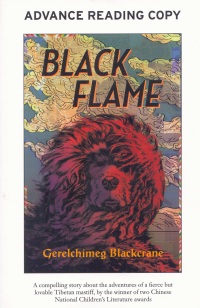| ________________
CM . . .
. Volume XIX Number 28. . . .March 22, 2013 
 |
Black Flame.
Gerelchimeg Blackcrane. Translated by Anna Holmwood.
Toronto, ON: Groundwood/House of Anansi Press, 2013.
240 pp., trade pbk., hc., ePub, $12.95 (pbk.), $16.95 (hc.), $12.95 (ePub).
ISBN 978-1-55498-107-6 (pbk.), ISBN 978-1-55498-135-9 (hc.), ISBN 978-1-55498-364-3 (ePub).
Subject Heading:
Tibetan mastiff-Juvenile fiction.
Grades 5 and up / Ages 10 and up.
Review by Michelle Superle.
*** /4
Reviewed from Advance Reading Copy.
|
| |
|

excerpt:
Kelsang pretended to bite Han Ma’s hand, as if about to crunch through flesh and bone, but he just held the hand in his mouth. Underneath his mess of fur, his eyes were as calm as a lake warmed by the evening sun.
And so man and mastiff rolled around... Kelsang untangled himself and leapt to one side before jumping back on top of Han Ma. The spectators quickly understood that it was a game, and after a while, they went about their own tasks.... Kelsang stopped and lay down, panting. The look of pure joy was still in his eyes.
Dogs lovers who love to read are in for a blast from the past. Black Flame, a novel about a Tibetan mastiff, reads like a classic dog story from 100 years ago—in particular, Jack London’s The Call of the Wild. Black Flame is likely to appeal to discerning readers aged 10 and up (Grade 5 and up). It will be exciting for young Canadians to steal a glimpse into a dog’s life in Tibet and Mongolia (yes, the hound gets around!)—and to experience the writing of Gerelchimeg Blackcrane, a celebrated writer of Mongolian descent who has won two Chinese National Children’s Literature awards.
Black Flame presents a rare opportunity in contemporary Canadian children’s literature: the chance to traverse unguided into another world. The book has been admirably translated by Anna Holmwood but offers no gloss for cultural references. Thus, Canadian readers will be as immersed in the unfamiliar worlds of nomadic Tibet and one of its key cities, Llasa, as the canine protagonist, Kelsang, is in the perplexing world of human beings. Readers are likely to learn as much as Kelsang, himself, does about his surroundings.
Readers may require fair warning, though: this traditional dog story is not the kind of warm and fuzzy feel-good tale that has become beloved in the recent past. Instead, most of the narrative reads as a kind of Dickensonian progression of Kelsang’s powerless experiences being shunted from owner to owner and place to place—each worse than the last. He encounters hardship, abuse, and neglect. More disturbing than this, however, are the many violent episodes in the tale. Kelsang is a fighter both by nature and by circumstance and is forced into several fights to the death with wolves and other dogs.
Although the fierce Tibetan mastiff dog acts violently in self-defence, at heart he’s also a lover. Throughout all his misadventures, his fervent desire is to return to work with the sheep, grasslands, and nomadic master he first knew. This cannot come to pass, but all is not grim to the end: Kelsang fortunately finds a new master—a kind school teacher who enlists the dog’s help in protecting his young charges, some of them handicapped children. Finally, Kelsang achieves what he’s wanted all along—a meaningful, safe place in the world.
While some of the narrative recalls the cloying, melodramatic plot turns of its literary predecessors, on the whole Black Flame provides an exciting, compelling story with a deeply satisfying resolution.
Librarians will certainly want to recommend Black Flame to their dog-loving patrons, as well as to young readers who enjoy old-fashioned tales. In classrooms, teachers will find the novel provides a clear window into Tibetan life.
Recommended.
Michelle Superle is the author of Black Dog, Dream Dog (Tradewind, 2010) and “Animal Heroes and Transforming Substances: Canine Characters in Contemporary Children’s Literature” (in Animal Others and the Human Imagination, Columbia UP, 2012). She teaches children’s literature and creative writing at the University of the Fraser Valley.

To comment
on this title or this review, send mail to cm@umanitoba.ca.
Copyright © the Manitoba Library Association. Reproduction for personal
use is permitted only if this copyright notice is maintained. Any
other reproduction is prohibited without permission.
NEXT REVIEW |
TABLE OF CONTENTS FOR THIS ISSUE
- March 22, 2013.
AUTHORS |
TITLES |
MEDIA REVIEWS |
PROFILES |
BACK ISSUES |
SEARCH |
CMARCHIVE |
HOME |
